
William Edward "Little Willie" John was an American R&B singer who performed in the 1950s and early 1960s. He is best known for his successes on the record charts, with songs such as "All Around the World" (1955), "Need Your Love So Bad" (1956), "Talk to Me, Talk to Me" (1958), "Leave My Kitten Alone" (1960), "Sleep" (1960), and his number-one R&B hit "Fever" (1956). An important figure in R&B music of the 1950s, he faded into obscurity in the 1960s and died while serving a prison sentence for manslaughter.

Pilgrim is the thirteenth solo studio album by the British rock musician Eric Clapton, released on 10 March 1998 for Reprise Records. The album features all-new studio-recorded material, the first to do so since Clapton's 1989 hit album Journeyman and was nominated for several music awards. Although most of the critics responded negatively to the 1998 studio effort, it was one of Clapton's most commercially successful albums, reaching the Top 10 in twenty-two countries.
Sunshine pop is a subgenre of pop music that originated in Southern California in the mid-1960s. Rooted in easy listening and advertising jingles, sunshine pop acts combined nostalgic or anxious moods with "an appreciation for the beauty of the world". The category largely consists of lesser-known artists who imitated more popular groups such as the Mamas & the Papas and the 5th Dimension. While the Beach Boys are noted as prominent influences, the band's music was rarely representative of the genre.

"Classical Gas" is an instrumental musical piece composed and originally performed by American guitarist Mason Williams with instrumental backing by members of the Wrecking Crew. Originally released in 1968 on the album The Mason Williams Phonograph Record, it has been rerecorded and rereleased numerous times since by Williams. One later version served as the title track of a 1987 album by Williams and the band Mannheim Steamroller.
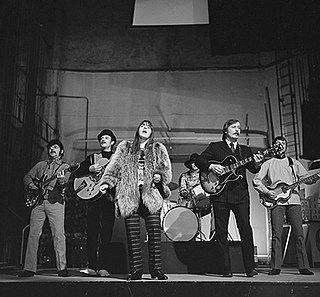
Spanky and Our Gang was an American 1960s sunshine pop band led by Elaine "Spanky" McFarlane. The band derives its name from Hal Roach's Our Gang comedies of the 1930s, because of the similarity of McFarlane's surname with that of George McFarland (Spanky). The group was known for its vocal harmonies and had major hits in the US and Canada in 1967–1968 with "Sunday Will Never Be the Same," "Lazy Day," "Sunday Mornin'," and "Like to Get to Know You."

Pattie Brooks is an American singer most frequently associated with the disco era. She was born in Fort Riley, Kansas to a military family. Her first break came in 1968 when she auditioned for the chorus on The Smothers Brothers Comedy Hour. In the next decade she became a sought-after backing singer, appearing on the Bobby Darin Show and touring with, among others Helen Reddy. She sang backing vocals on Donna Summer's album I Remember Yesterday.

Irving Lee Dorsey was an American pop and R&B singer during the 1960s. His biggest hits were "Ya Ya" (1961) and "Working in the Coal Mine" (1966). Much of his work was produced by Allen Toussaint, with instrumental backing provided by the Meters.
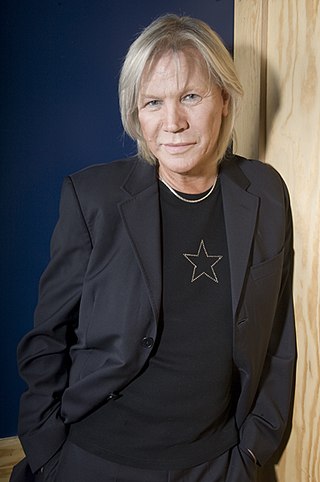
Patrick Juvet was a Swiss model and singer-songwriter, who had a string of hit records in Europe. While his early career was focused on making pop records, he found international success as a disco music performer in the latter half of the 1970s. His biggest hit, "I Love America", made the top twenty in France, Sweden and the UK, and the top ten in the US disco chart.

"This Guy's in Love with You" is a hit song written by Burt Bacharach and Hal David and released by Herb Alpert in May, 1968. Although known primarily for his trumpet playing as the leader of the Tijuana Brass, Alpert sang lead vocals on this solo recording, which was arranged by Bacharach. An earlier recording of the song by British singer Danny Williams with different lyrics, titled "That Guy's in Love", appeared on Williams' 1968 self-titled album.

The Sunshine Company was an American sunshine pop band from Los Angeles, California. Originally the duo of Mary Nance and Maury Manseau, the group later added the rhythm section of bassist Larry Sims and drummer Merel Bregante and signed to Imperial Records, releasing their debut album in 1967. They scored three hit singles on the U.S. singles chart over the next two years before disbanding after their third album, 1968's self-titled effort. Sims and Bregante later backed Loggins and Messina.

Portrait is a 1982 album by pop group The Nolans. It featured the UK top 20 singles "Chemistry" and "Don't Love Me Too Hard" and reached No.7 in the album charts. It was released earlier as Don't Love Me Too Hard in Japan with a slightly different track-listing, where it became one of the first 50 albums to be released on Compact disc.

"I Ain't Gonna Stand for It" is the second single from Stevie Wonder's 1980 album, Hotter Than July. It reached number four on the Billboard R&B singles chart and number 11 on the Hot 100. It also hit number 10 on the UK Singles Chart. The song is famous for Wonder's imitation of a seasoned country-and-western crooner and his inspiring drumming. Charlie and Ronnie Wilson of The Gap Band provide backing vocals on the song. It was covered by Eric Clapton in 2001.

American recording artist CeCe Peniston entered the music industry as a backup vocalist on the Overweight Pooch's album Female Preacher, released in July 1991 on A&M Records. Shortly before that, she was featured on the B-side to 12-inch single "I Can't Take the Power" by male rapper Marvelous JC. Besides her vocal performance on the Pooch's only charting track, "I Like It", she was given a credit for co-writing two compositions; "Kickin' Da Blues" and the titular "Female Preacher". Soon after, the singer pursued a solo career. By now, Peniston has released four studio albums including one as a member of The Sisters of Glory, two remix collections, one live album, four compilations and one live extended play (EP). Her singles discography features twenty-nine physical releases, twenty-one digital-only, seven promotional recordings and twenty-six other appearances; regardless of their format. She has also been included on one video album and has made fourteen music videos.
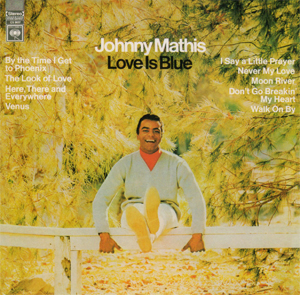
Love Is Blue is an album by American pop singer Johnny Mathis that was released on March 6, 1968, by Columbia Records and adhered even more strictly to the concept of the "cover" album of recent hits than its predecessor in that five of the 10 songs selected for the project were chart hits for the original artists within the previous year and another three had charted within the previous decade. Even the two remaining selections that did not bring chart success to the original artists were by the hit songwriting teams of Burt Bacharach and Hal David and John Lennon and Paul McCartney and left no room for the usual inclusion of some original songs or material from Broadway.
The Sugar Shoppe was a Canadian sunshine pop vocal group who recorded in the late 1960s and featured actor Victor Garber.

Johnny Mathis has recorded 73 studio albums, 10 of which achieved sales of 500,000 units and were awarded Gold certification by the Recording Industry Association of America. Six of his compilation albums also accomplished this, and of these 16 Gold albums, six eventually went Platinum by reaching sales of one million copies. In 1999, sales figures totaled five million for his first holiday LP, Merry Christmas, and three million for Johnny's Greatest Hits, a 1958 collection that has been described as the "original greatest-hits package" and once held the record for most weeks on Billboard magazine's album chart with a total of 490. His second longest album chart run was the 295 weeks belonging to his Platinum 1959 album Heavenly, which gave him five weeks in the top spot. In a ranking of the top album artists of the last half of the 1950s in terms of Billboard chart performance, he comes in at number two, for the 1960s, number 10, and for the period from 1955 to 2009 he is at number six.

"(I) Get Lost" is a pop song written and recorded by the British rock musician Eric Clapton. The title was released as both a single on 23 November 1999 for Reprise Records and is featured as part of the compilation album Clapton Chronicles: The Best of Eric Clapton, which was released on 12 October 1999. It was written for the movie The Story of Us.
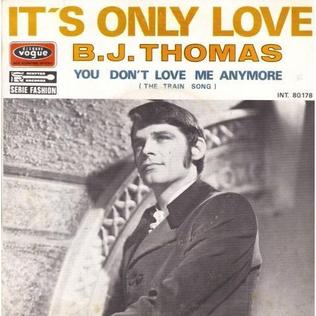
"It's Only Love'" is a 1969 song by B. J. Thomas from his LP Young and In Love. Elvis Presley made the song a top hit in the UK, reaching No. 3 in 1980.
"Do It in the Name of Love" is a song written by Bobby Bloom and Neil Brian Goldberg.
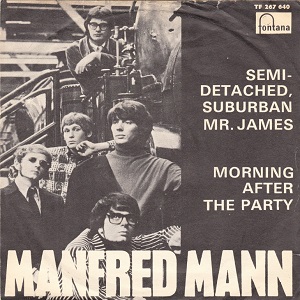
"Semi-Detached, Suburban Mr. James" is a song written by songwriters Geoff Stephens and John Carter, recorded by English pop group Manfred Mann in 1966. Previous to this, it was recorded by the band Herbie's People who were signed to CBS and had recorded other John Carter songs. The original title was ....Mr Jones and was recorded that way by Herbie's People. Their version was pulled by CBS when Manfred Mann said they'd record it. It was subsequently issued but only in the USA on the Okeh label. Stephens and Carter, who were writers for a publishing company on Denmark Street, London, wrote the song in a style different from their usual compositions, as love was not the prevalent theme. Introduced to the song by producer Shel Talmy, Manfred Mann recorded it at Philips Studio in August 1966. Released by Fontana Records on 21 October 1966, the song was backed by drummer Mike Hugg's composition "Morning After The Party" as the group's second single on the label. Keyboardist Manfred Mann plays the Mellotron on the recording; it was one of the earliest recordings featuring the instrument. Following a trend set by Bob Dylan, the song tackles the subject of life in British middle class suburbia from the perspective of a narrator, who laments the loss of a lover after her marriage to another man.

















